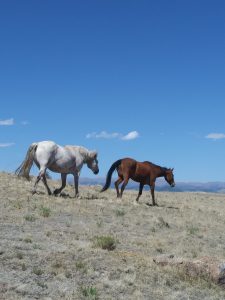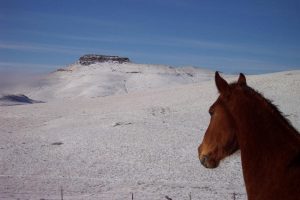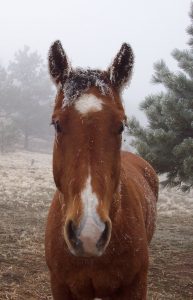Sweet Moondo
In the background of all the unnerving events of 2020, a more private anguish has been unfolding for us.
Back in early March, on one of the days I was rushing off to one appointment or another, I was driving past the feed boxes where the horses were eating their breakfast—except only one was munching. Jake’s head was down, all business with the hay, but Moondo was standing off to the side, uninterested. I stopped to check on him, but could see no obvious injuries or signs of distress. He greeted me cordially, as always, but a horse not eating on a chilly winter morning was cause for concern. He’d been even more finicky than usual for much of the winter, and had lost some weight, so I called the vet and scheduled a check-up.
The diagnosis, two days later, was chronic kidney disease; the treatment, effectively, palliative care.
In a pattern that would repeat at irregular intervals over the next few months, Moondo’s appetite returned, and he maintained his regular daily schedule, leading Jake out into the pasture to graze and nap and, at the allotted times, sauntering back in for water or to wait near the gates at feeding time. The notable change in his daily plan was giving him time alone in the morning with extra portions of grain and hay, as we tried to entice him to eat enough to maintain his weight.
This last development outraged Jake, but the extra calories helped stabilized Moondo somewhat. Doug and I got used to our own new daily schedule, with the added feeding and with twice-daily reports to one another regarding quantity consumed, or not. Every ten days or so, Moondo would lose his appetite, and nothing we could offer appealed to him. He’d wander away, leaving his leftovers to a mule deer doe and a family of ground squirrels. I tried different feeds and combinations, eventually discovering that plain oats would sometimes entice him to eat a little, like a queasy person nibbling a saltine cracker.
What he craved most, though, was the thing I was least able to provide: fresh grass. Although warmer weather in April and May brought a weak flush of new growth, the persistent dry weather meant the plants were unable to regenerate under the horses’ grazing. June was parched and throughout the first half of July, every monsoon thunderhead that formed either failed to rain or dropped its precipitation somewhere else.

Still setting the schedule, July 2020.
I started hand grazing him, the two of us meandering along the driveway, through the meadow next to the road, or in a circle around the hay garage, where he usually dedicated focused attention to a patch of mountain bluegrass near the gutter downspout. Out in the meadow, Moondo trailed like a hound, nose skimming the ground for the scent of favored grasses like low-growing blue grama and dropseed. I’d mostly hang on to the end of the lead rope and let him pull me along wherever he wanted to go, although once the bunchgrasses began setting seed, however sparse, I would steer him to patches of fescue and mountain muhly. He would gather the sprays of stems with a deft twirl of his upper lip, yank, and chew with something close to enthusiasm. If he spotted a Platte thistle, he would drag me over to it and take his time nipping off flowers and buds, rolling them carefully on his tongue to find the least prickly angle on which to bite down.
He’d been getting a little wobbly, so I was careful to avoid steep terrain or rocky ground. One day when we were across the driveway from the barn, however, he threw me a sly glance before he hopped up the cutbank and set to work grazing the bunchgrasses on the sharply angled slope. He’d had his eye on that patch for a while, but I’d been stopping him from climbing the bank, worried he’d fall. He’d seen his opportunity and taken it, so I let him graze for a while, zig-zagging across the slope until I maneuvered him to a place where he could step down with relative ease.
I thought I might be able to buy enough time, and sustenance, to get him through until it rained. Despite a couple of hours of hand-grazing each day and as much hay and grain as we could persuade him to eat, by mid-July Moondo had gotten painfully thin: a mobile lesson in equine skeletal anatomy. He still was acting like himself, mild-mannered yet opinionated, but he began to spend long hours withdrawn into something more like a stupor than a doze. Grazing at the bottom of that steep bank near the barn one afternoon, he paused in his eating and adjusted his feet. I thought he was going to have a pee, but no: his eyelids drooped and he dozed off. I had to wake him and lead him slowly back to the pasture.
A day or two later, out along the road, he nosed past the patch of seedheads I’d taken him to, looking for something he couldn’t find. When he also bypassed a Platte thistle with juicy open flowers, I knew he had turned a corner, and was heading to a place where I couldn’t follow. We put him down on July 20th, burying him behind the barn near his old friend Max.
Moondo came into my life in the fall of 2004. Having space for horses was part of what brought us to this area, but I did not anticipate how much their presence would alter how I think about and understand the human relationship to place. Thanks to Moondo and his pasture-mates—first old Blue, then dignified Max, and now survived by Jake—I’m aware of different dimensions of the landscape. I often think about different ways of sensing, of seeing, and I try to imagine what I cannot sense, cannot see. I’m confident I know this place differently and more deeply because of Moondo, but I’m also certain I know precious little compared to him: he was hypervigilant and curious, feeling the land under his feet and the wind through his mane 24 hours a day, 365 days a year.
Events this summer have pushed me to think a lot about privilege, about loss and change and death, about what I value, and about the values members of a human society share. Losing Moondo has magnified the months-long sense of unbalance and insecurity, but if he were still here, his presence would offer the same counsel it did for nearly 16 years. Pay attention. Position yourself to catch the first light of the sun. Accept that the wind will blow, and learn where the ripples of the hillsides swirl it toward calm. Take cover from the thunder, but be prepared to tough it out when the cold of winter sets in. Leave the rattlesnakes alone. Savor the grass. Just stand still sometimes, and be where you are.
On one of the days in mid-July when we were out in the meadow, Moondo abruptly stopped nibbling and set off at a determined march across the meadow. He tugged at the rope, hauling me along until we reached the edge of the ridge, where the ground fell away toward the northeast. He went there not to eat, but to look. We stood there for several minutes, side by side, gazing across the wooded slopes and rock-jumbled grasslands between here and Pikes Peak, quietly taking in the view.
What a place.
What a horse.

2006




